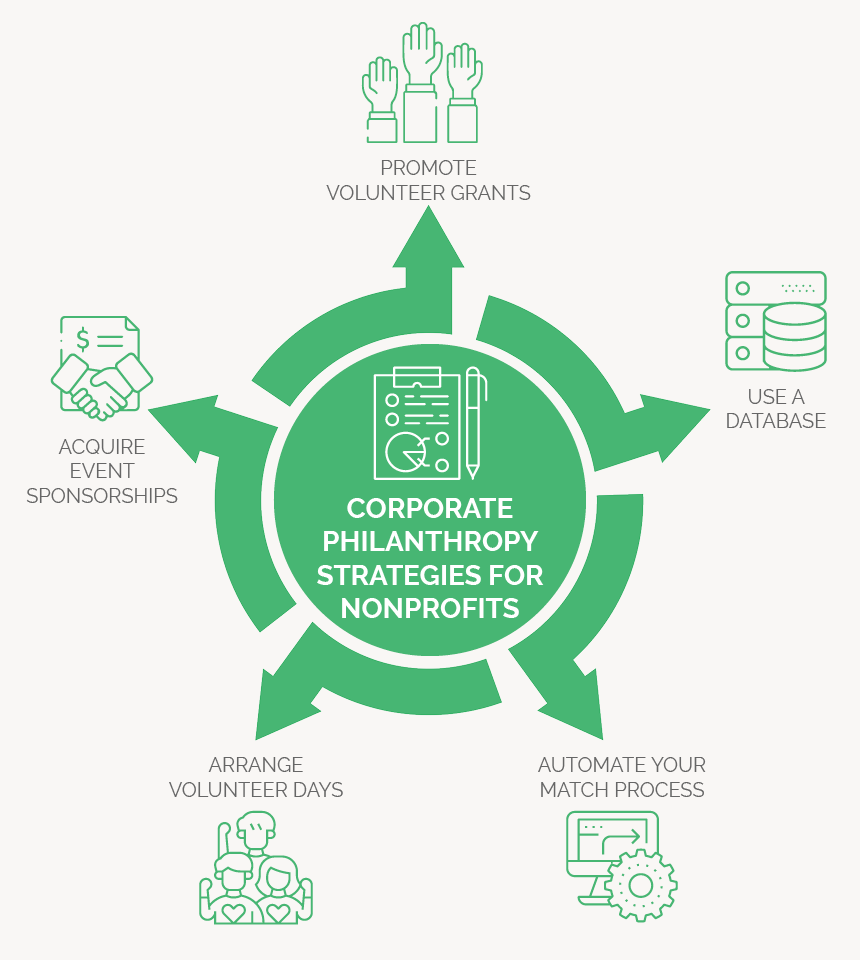Why modern companies use corporate philanthropy to solidify brand loyalty and customer trust
Exploring How Company Philanthropy Shapes Brand Name Credibility and Customer Commitment
Business philanthropy significantly affects brand credibility and customer commitment. Companies that take part in authentic philanthropic initiatives frequently see a favorable shift in just how consumers regard them. This positioning of values fosters trust fund and psychological connections with target markets. The effectiveness of these humanitarian efforts can vary substantially. Comprehending what absolutely resonates with customers is important for brand names seeking to improve their social influence and market setting. What strategies will become necessary for future success?
The Evolution of Business Philanthropy
As businesses progressively identify their role in culture, the evolution of business philanthropy has actually transformed from simple philanthropic donations to a tactical element of brand name identification. Initially, business took part in philanthropy primarily for tax benefits or to enhance their public picture. In time, this strategy changed as stakeholders-- including customers, workers, and financiers-- required an extra authentic dedication to social responsibility.
Organizations started straightening their kind campaigns with their core worths and organization purposes, leading to even more thoughtful and impactful contributions. This adjustment has actually urged firms to purchase lasting methods and neighborhood advancement, fostering a sense of objective that resonates with consumers.
Technical improvements have actually promoted transparency and engagement, permitting services to showcase their philanthropic initiatives much more efficiently. Subsequently, business philanthropy has arised as an indispensable part of business approach, with companies welcoming the opportunity to favorably influence culture while improving their overall brand name story.
The Impact of Philanthropy on Brand Name Understanding
While firms participate in kind efforts to advertise social excellent, these efforts greatly form brand understanding amongst consumers. Business philanthropy can boost a brand's image by connecting it with positive social effect and area involvement. Consumers frequently regard brands that proactively get involved in charitable tasks as even more trustworthy and accountable. This understanding can affect acquiring choices, as consumers may like brand names that show a commitment to social concerns.

Structure Emotional Links Through Providing
Business philanthropy functions as an effective tool for enhancing brand identity by linking company worths with community requirements. With tactical providing, business can promote area interaction and create shared values that resonate with customers on an emotional degree. This strategy not just strengthens brand credibility however likewise builds lasting connections in between businesses and their stakeholders.
Enhancing Brand Name Identity
They not just add to societal excellent but likewise forge deeper emotional links with their target markets when companies engage in kind efforts. By straightening their brand with philanthropic reasons, firms boost their identification and signal worths that resonate with customers. This placement creates a story that exceeds services and items, inviting customers to join a shared goal. As consumers increasingly prioritize purpose-driven brands, firms that actively take part in providing can separate themselves in a congested market. Such initiatives cultivate a sense of loyalty among clients who really feel personally linked to the brand name's values. Inevitably, corporate philanthropy comes to be a necessary tool for improving brand identity, growing long lasting partnerships based upon common beliefs and psychological engagement.
Fostering Neighborhood Involvement
Various researches indicate that business taking part in community-focused philanthropic campaigns can noticeably strengthen emotional links with their stakeholders. By spending in local jobs and sustaining social reasons, businesses cultivate a feeling of belonging and trust fund within the community. This interaction cultivates a positive brand image, as clients value firms that demonstrate authentic worry for social issues. Additionally, workers frequently feel a lot more determined and proud to be related to a company that focuses on area well-being. Therefore, consumers are more probable to develop loyalty towards brand names that proactively add to purposeful reasons. Eventually, promoting neighborhood interaction through philanthropy not just boosts brand credibility but also builds long-term psychological connections that benefit both the company and the community it offers.
Producing Shared Values
Just how can organizations properly develop common values that resonate with their stakeholders? Firms can attain this by aligning their philanthropic initiatives with their core objective and the interests of their neighborhoods. By taking part in initiatives that resolve regional requirements, businesses cultivate psychological connections with consumers, enhancing brand name loyalty. For instance, partnering with non-profits that mirror shared values reinforces the brand name's image and shows commitment to social responsibility. Furthermore, clear interaction about these initiatives allows stakeholders to see the substantial impact of their payments. Ultimately, by incorporating shared worths into their company philanthropy, business not just improve their reputations however additionally cultivate long-term connections with clients, causing boosted commitment and count on. This alignment is necessary in modern customer decision-making.
Case Studies: Effective Philanthropic Campaigns
Examining effective kind campaigns exposes numerous techniques that enhance brand name track record. Impactful area campaigns, innovative partnership designs, and long-term engagement methods have actually shown efficient in cultivating favorable connections with consumers. These situation studies highlight the value of thoughtful corporate giving up accomplishing both social and service purposes.
Impactful Community Initiatives
Numerous business have effectively leveraged kind projects to enhance their brand credibility while making a significant effect in their neighborhoods. A technology firm released an electronic proficiency program in underserved areas, giving training and sources that encouraged regional citizens. This effort not only contributed to community development yet additionally placed the business as a socially accountable leader. A major food firm applied an appetite relief campaign, partnering with neighborhood nonprofits to disperse meals to families in demand. This initiative strengthened area connections and cultivated consumer commitment. Through these impactful efforts, companies have actually demonstrated their commitment to social duty, successfully aligning their brand name values with the needs of the areas they serve, inevitably boosting their overall reputation.
Cutting-edge Partnership Versions
The success of impactful neighborhood initiatives usually depends upon cutting-edge collaboration models that bring with each other diverse stakeholders to resolve complex social obstacles. Study show just how corporations, non-profits, and federal government entities can work together effectively. For circumstances, an international company partnered with a neighborhood non-profit to introduce an education program, merging resources and know-how to enhance neighborhood proficiency rates. One more instance involved a technology firm and a healthcare organization joining pressures to create a telemedicine solution for underserved populations. These partnerships not just amplified the reach of humanitarian initiatives yet additionally reinforced the brands' from this source track records by straightening their goals with community needs. Eventually, ingenious collaboration versions act as a catalyst for meaningful modification and foster stronger connections between brands and their consumers.
Long-lasting Engagement Techniques

Gauging the ROI of Business Social Responsibility
As firms progressively spend in business social responsibility (CSR) campaigns, comprehending the return on investment (ROI) linked with these efforts comes to be crucial. Determining ROI in CSR is multifaceted, commonly including both qualitative and measurable metrics. Economic returns can be examined through boosted sales, enhanced brand name loyalty, and enhanced employee morale, which can cause higher performance. Additionally, firms may examine cost savings connected to sustainable methods, such as reduced waste or power usage.
Qualitatively, the influence of CSR on brand online reputation can be assessed with customer perception researches and social media belief evaluation. Surveys can supply understandings into exactly how CSR tasks affect customer loyalty and depend on. Benchmarking versus industry requirements can assist companies determine their CSR effectiveness - corporate philanthropy. Ultimately, a complete approach to determining ROI makes it possible for companies to make informed decisions regarding future CSR financial investments, straightening approaches with both economic efficiency and social impact
Customer Assumptions and Company Duty
Increasingly, consumers expect companies to operate with a strong feeling of company duty, viewing ethical practices as a prerequisite for brand loyalty. This change in assumption mirrors an expanding recognition of ecological and social problems, leading clients to prefer brands that line up with their values. Consumers are more likely to sustain business that take part in transparent practices, show sustainability, and add favorably to their neighborhoods.
Social media enhances these assumptions, enabling customers to share their experiences and viewpoints rapidly. Brand names that fall short to fulfill these ethical standards take the chance of backlash, while click over here those that welcome business responsibility usually take pleasure in enhanced online reputation and customer commitment. As consumers demand liability, companies have to integrate business social responsibility right into their core strategies, prioritizing moral behavior not equally as a marketing method, however as a basic element of their procedures. This alignment can eventually bring about stronger brand fondness and sustained success in competitive markets.
Future Fads in Corporate Philanthropy and Brand Commitment
The landscape of corporate philanthropy is progressing, affected by the heightened consumer assumptions bordering corporate obligation. Business are significantly integrating social impact right into their core business techniques, not simply as a secondary task. Future trends indicate a shift towards openness, with brand names sharing thorough information about their kind initiatives and their direct effects on neighborhoods.
Modern technology is playing a crucial role, enabling real-time engagement between consumers and brand names. Social media site systems promote straight interaction, enabling consumers to voice their expectations and hold brands accountable. Additionally, more youthful generations, specifically Millennials and Gen Z, focus on sustainability and honest methods, driving companies to adopt even more diligent techniques.
As business philanthropy ends up being synonymous with brand identification, business that authentically align their missions with social demands from this source are most likely to foster stronger consumer commitment. This convergence of worths will inevitably shape the future of corporate reputation and customer connections in a progressively conscientious industry.
Often Asked Questions
Just How Do Customers Learn about a Business's Philanthropic Efforts?
Customers find a company's kind efforts through numerous channels, consisting of social networks, press releases, area events, and word-of-mouth. These methods assist in awareness, making it possible for individuals to involve with brands that straighten with their worths and rate of interests.
What Role Does Worker Participation Play in Business Philanthropy?
Staff member involvement in company philanthropy enhances involvement, fosters a feeling of ownership, and reinforces team communication - corporate philanthropy. This participation commonly enhances the influence of charitable efforts, bring about greater understanding and assistance for the firm's philanthropic efforts
Can Corporate Philanthropy Backfire on a Brand name's Reputation?
If viewed as opportunistic or insincere, company philanthropy can certainly backfire on a brand's reputation. Unfavorable public understanding might arise, bring about reduced trust fund and commitment among consumers who prioritize authenticity in company actions.
Are Smaller Companies as Efficient in Philanthropy as Larger Companies?
Smaller sized business can be just as reliable in philanthropy as bigger firms, often demonstrating agility and authenticity. Their local initiatives might reverberate a lot more deeply with neighborhoods, cultivating real links in spite of restricted sources compared to their larger counterparts.
How Can Companies Pick the Right Creates to Assistance?
Firms can pick the appropriate trigger by straightening their worths with neighborhood requirements, evaluating stakeholder interests, and assessing prospective effect. This tactical method fosters authenticity, boosts involvement, and enhances connections with customers and the wider neighborhood.
While business engage in kind initiatives to promote social good, these campaigns substantially form brand perception amongst consumers. As consumers significantly focus on purpose-driven brand names, firms that proactively engage in offering can separate themselves in a congested market. Many firms have effectively leveraged philanthropic projects to enhance their brand credibility while making a purposeful influence in their communities. Progressively, customers anticipate companies to run with a strong feeling of company duty, viewing honest methods as a requirement for brand commitment. As corporate philanthropy ends up being associated with brand identification, firms that authentically straighten their missions with societal requirements are most likely to promote more powerful consumer loyalty.